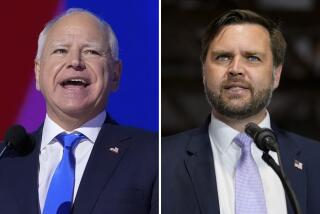Presidential Debates in ’88
- Share via
I applaud the announcement that the Republicans and Democrats will sponsor the 1988 presidential debates, not because the parties are taking the debates away from the League of Women Voters, but because it is more likely that there will be more than one debate and that the forums scheduled will occur.
As the league’s regional coordinator for the 1980 presidential debates, the biggest problem faced was getting the candidates to the podium. The debates traditionally come toward the end of the campaign process when the candidates are frantically combing the country kissing babies and more. The 1980 debate scheduled for Portland, Ore., never came off primarily because both candidates and their staffs couldn’t get to the Pacific Northwest at the same time. With the party backing and setting up the debates, the forums would be mandatory for their participation.
Presidential candidates traditionally hate to debate. Historians often claim the debates of 1960 and 1976 cost the Republicans the election and that the 1980 debates wooed many Democrats to vote Republican. Needless to say, prepackaged advertisements and media coverage are preferred to debate. A reporter can always be blamed for a bad story and the ads put together by the PR people are perfect. In this world where Madison Avenue has made laxatives and mini-pads exciting, a viable candidate certainly is no problem.
The goal of the debate process is to get the candidates into the living rooms of the people and, hopefully, the parties will force the candidate on-screen. The debates are needed to test if the candidates can go it alone, stand on their own two feet and think, qualities that have historically endeared such greats as Thomas Jefferson and Abraham Lincoln to the American people. And if a joint committee is the way to make the debates happen, then let it be.
The important thing, though, is that the hopefuls now stalking Iowa and the nation know that debating is expected, by the political parties and the people.
JANE A. DELLAGROTTA
Fullerton
More to Read
Get the L.A. Times Politics newsletter
Deeply reported insights into legislation, politics and policy from Sacramento, Washington and beyond. In your inbox twice per week.
You may occasionally receive promotional content from the Los Angeles Times.










